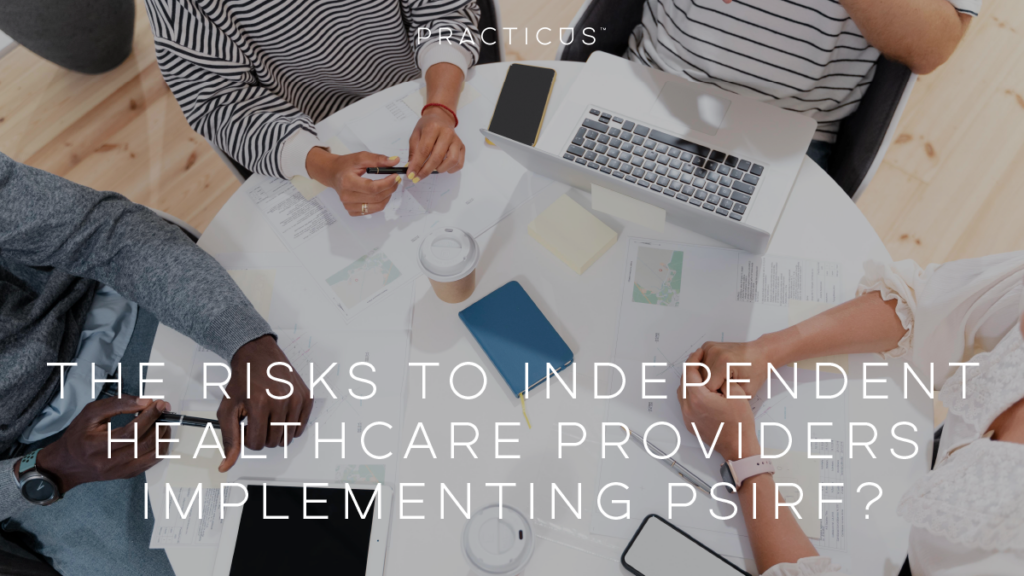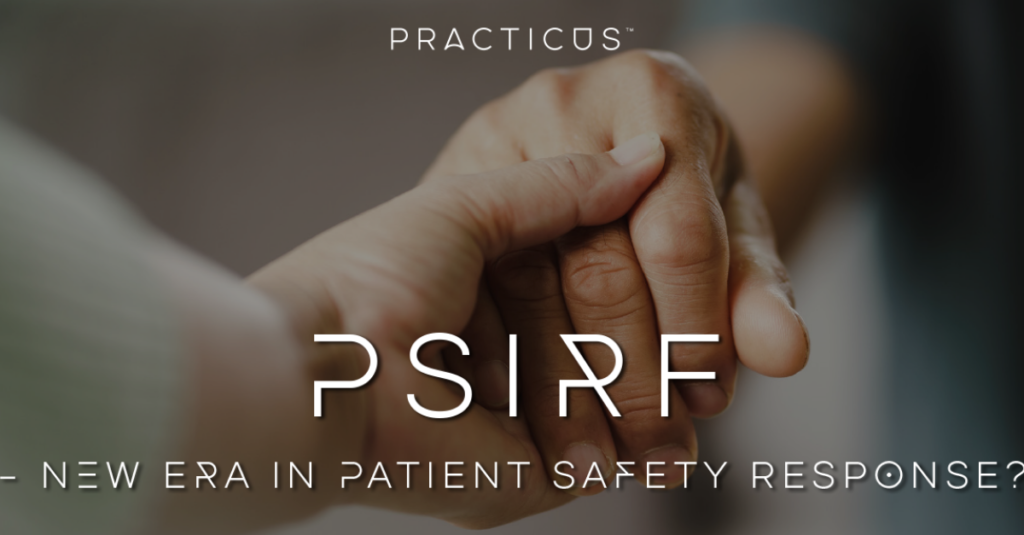Independent healthcare provider risks implementing PSIRF
Patient Safety Incident Reponse Framework (PSIRF) is a revised part of the NHS Patient Safety Strategy 2019, which is laying the foundation for a new way of responding when patient safety issues occur. A recent panel discussion hosted by IHPN and Practicus highlighted some of the challenges.

Independent Healthcare Providers Network (IHPN) in partnership with Practicus, recently hosted a roundtable discussion with industry practitioners and leaders from independent healthcare providers and the NHS. The practitioners support the emerging Patient Safety environment, but also outlined some of the perceived risks.
The Discussion
IHPN in partnership with Practicus, recently hosted a roundtable discussion with industry practitioners and leaders from independent healthcare providers and the NHS.
The panel came together to share their experiences, observations and thoughts around potential risks with the rollout of the new Patient Safety Incident Response Framework (PSIRF). (This is part of the NHS Patient Safety Strategy 2019, which is laying the foundation for a new way of responding when patient safety issues occur.)
The panellists represent a cross-section of healthcare professionals covering responsibility for patient safety, quality and risk management. Two participants were able to bring their ‘early adopter’ PSIRF implementation experience into context.
Discussion was moderated by Practicus and took place under Chatham House rules.
What does PSIRF offer, patients, families and providers that SIF does not?
- PSIRF enables individual organisations to decide which incidents are to be investigated. While this is empowering – enabling more attention to be placed on the incidents that need it most – it is potentially open to abuse. Transparency in the process will therefore be key
- Family consultations are not something the current system caters for enough so it’s good news that one of the four pillars of PSIRF is dedicated to improving the involvement of the families of affected patients. Timely communication and closure are often what affected families want. Why should a family wait 3 or 4 months for investigations to take place, when a clinical review with the right acknowledgments and outcomes can be arrived at sooner?
- PSIRF aims to move away from reactive and hard-to-define thresholds for serious incidents and toward a proactive approach to learning from when things go wrong, with the emphasis placed on the system and culture that supports continuous improvement in patient safety
RISK – There is a perceived risk that in the event of a decision not to formally investigate is made on the grounds there is no new learning to be gained, the patient and family members may disagree. This situation and expectations would need to be managed with care and compassion. How do providers ensure that a family understands why an investigation is not being undertaken?
What engagement was possible with Commissioners, Integrated Care Systems and Stakeholders during the Pilot?
- Engagement with the ICS or access to patient safety resources may not be easy. It is understood that existing CCG contracts will get moved across to the local ICS but stakeholders such as commissioners may change and their expectations of the provider may also change. Failure to comply, regardless of the reason such as lack of access to training or clarity form commissioners could put contracts at risk.
- However, it was also pointed out by one of the providers, that in cases of multiple relationships with different stakeholders, the risk may be less of non-engagement but more of inconsistent engagement, with some commissioners continuing to engage better than others.
RISK – There is an observation that smaller independent sector providers or providers such as those operating in the third sector, may be less well equipped and resourced to handle the workload that goes with PSIRF and its implementation. It is therefore important that new ICSs fully engage with all providers – both NHS and independent sector to ensure that PSIRF is fully implemented.
What are the challenges of operationalising PSIRF within organisations
- The panel agreed that successful implementation of PSIRF depends very much on having access to the right training.
- A list of certified training providers is already available but the risk was identified that with all healthcare organisations, whether private or NHS, needing to get ready for PSIRF within the same timeframe, would there be enough capacity to meet the heavy demand?
RISK – Not being able to access timely and appropriate training as a result of training market capacity was identified as a potential risk.
Will the expectation of doing less investigations, lead to less work in the long run?
- One of the underpinning principles of PSIRF is to do fewer “investigations” but to do them better. Better means taking the time to conduct systems-based investigations by people that have been trained to do them. Consequently, an expectation that there will be less work is unrealistic and there is a risk that PSIRF will not only create more work during its adoption and early implementation phase but will have longer-term workload impacts.
- Among the independent providers much of this ‘extra’ work is currently being absorbed by staff into current workloads, and this may be because they tend to be smaller organisations. Larger NHS organisations such as Trusts have been actively recruiting to cover this workload.
RISK – PISRF may not reduce but increase patient safety workload, which challenges the independent sector more than larger central teams.
Is there a risk that capacity issues can lead to serious elements being overlooked?
- There is an expectation the new guidelines will lead to improvements. Workload in this new framework is a concern and capacity can impact quality.
- It is recognised that NHS organisations and some larger independent sector providers have corporate teams that step in to conduct reviews as required. The risk here is that while taking a corporate lead, there is a danger that relevant local input may be lost or diluted.
RISK– There is a risk that the internal capacity to deal with patient safety issues, could challenge quality issues in patient safety investigations. This potential exists under the current framework.
Would independent providers benefit from more collaboration around PSIRF?
- It was agreed that smaller providers within the independent healthcare sector may be more challenged in delivering, resourcing and sustaining the new PSIRF framework due to some of the issues such as access to training. This could lead to an inherent reputational risk at the industry level, in the event of some providers not being able to meet the new requirements as well as others.
RISK – As PSIRF is rolled out, smaller providers may not be able to reach the highest standards of PSIRF, without additional help or support.
Are cultural workforce changes required to embed PSIRF into organisations?
- PSIRF requires a significant cultural and mindset shift. This change is also set against the challenging backdrop of transitioning to the ICS environment. This is change will add to workforce demand as the ICSs start to shape their own views on PSIRF and their expectations of providers.
- Bringing about cultural change takes investment, time and effort. It also needs leadership, as successful cultural change is driven from the top
- In the absence of the publication of the full details and guidelines from the pilots, some panellists have been hampered getting their Board members fully informed and engaged.
Risk – If the cultural shift is not made, and people continue to look at PSIRF through the prism of SIF, then there is a risk to successfully implementing PSIRF. The challenge is to embed an approach to investigating that forms part of the wider response to patient safety incidents whilst allowing time to learn thematically from the other patient safety insights.
Final thoughts
In summary, the panel discussed and identified risks in the areas of:
- Access to training
- Cultural shift required
- Impacts of workforce and workload
- Need for top down leadership and ownership
- Need for consistent stakeholder engagement
- Increased involvement of patients
If providers can be aware of the type of risks they might encounter, that can help mitigate them, especially if there is a robust forum for networking, best practice sharing and learning resources.
The participants suggested a number of things the IHPN could support the sector with:
- Providing a supportive forum for networking to ensure the sector is on the same page
- Share best practice and learning among members, so that organisations can benefit collectively from resources and education.
- Co-ordinate a supportive buddy service for smaller providers to help them implement PSIRF
- Helping all providers to get access to the right training that is required.
IHPN appreciated the input and said they would take these points into consideration for future activity.
Overview of PSIRF
Interim Management Services
Services for Health & Social Care
About Practicus
Our purpose is to help people and their organisations navigate change. We take an integrated approach to change, combining robust change management and project management with subject matter expertise in strategy, technology, behaviour, data and operational efficiency.
Our services include Consulting, Recruiting and Advising.


